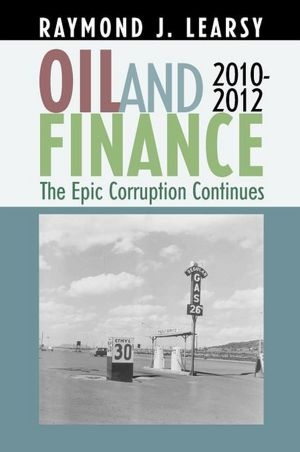Oil and Finance
The Epic Corruption Continues 2010-2012
One standard definition of “epic” is “surpassing the usual or ordinary, especially in scope or size.” It is unfortunate that Raymond Learsy is not exaggerating when he uses the term in the title of his new book, Oil and Finance: The Epic Corruption Continues 2010-2012. Here, Learsy’s regular Huffington Post columns are collected into a cohesive two-year narrative indicting the individuals and organizations he sees as the specific culprits in that grand-scale corruption.
With Oil and Finance: The Epic Corruption Continues 2010-2012, Learsy continues the careful analysis of these subjects that he began with his previous book, Oil and Finance: The Epic Corruption from 2006 to 2010. Learsy has made a few improvements with the new volume, most notably that these columns run chronologically, not by subject matter, which helps the reader better appreciate the circumstances surrounding the topics of discussion. The book’s timeliness means that hot-button issues like the Marcellus Shale deposits are fully addressed. Due to the serial nature of the original publications, there is some repetition of facts and opinions, but, for the most part, these points are strong ones that deserve to be covered again.
Learsy is fearless with his criticisms, even concerning The New York Times and its coverage of the events recounted in the book. When reporter Andrew Ross Sorkin and billionaire investor Warren Buffett defend Goldman Sachs, Learsy not only calls out the august newspaper’s investigative deficiencies, but also points out Buffett’s inherent conflicts of interest in publicly defending a firm into which he is heavily invested.
Domestically, Goldman Sachs and other bank holding companies draw Learsy’s ire; on the international front, he targets OPEC. Learsy writes, “OPEC is willfully manipulating the oil market and Wall Street Banks—JPMorgan Chase, Morgan Stanley, and Goldman Sachs—are using their official designation as bank holding companies to access cheap money from the Federal Reserve … to play casino with one of the core commodities of our economy.”
Learsy does not strike a political agenda, targeting Democrats and Republicans alike for their failures, and offering the occasional word of praise for figures who stand up and cry foul at the entire situation.
What elevates Oil and Finance: The Epic Corruption Continues 2010-2012 beyond mere expert reporting is that Learsy also offers creative suggestions on how to break free of the stranglehold of OPEC’s financial domination. These include ideas such as organizing America’s oil resources into a form of governmental entrepreneurship on the model of the Tennessee Valley Authority, or using the country’s vast food resources as a bargaining chip to counter the increasing economic cost of playing OPEC’s game, on OPEC’s terms.
For most readers, the volume will most certainly shed a revealing light on the energy issue. As one of only a few voices willing and qualified to eloquently challenge the status quo, Raymond Learsy has once again proven his insight to be invaluable.
Reviewed by
Peter Dabbene
Disclosure: This article is not an endorsement, but a review. The publisher of this book provided free copies of the book and paid a small fee to have their book reviewed by a professional reviewer. Foreword Reviews and Clarion Reviews make no guarantee that the publisher will receive a positive review. Foreword Magazine, Inc. is disclosing this in accordance with the Federal Trade Commission’s 16 CFR, Part 255.

